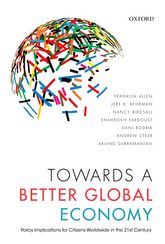Towards a Better Global Economy: Policy Implications for Global Citizens in the 21st Century
Jere R. Behrman
2014
Oxford University Press
Authors: Franklin Allen, Jere R. Behrman, Nancy Birdsall, Shahrokh Fardoust, Dani Rodrik, Andrew Steer, and Arvind Subramanian
Substantial progress in the fight against extreme poverty was made in the past two decades. But the slowdown in global economic growth and significant increases in income inequality in many developed and developing countries raise serious concerns about the continuation of this trend into the twenty-first century. The time has come to think seriously about how improvements in official global governance, coupled with and reenforced by rising activism of “global citizens,” can lead to welfare-enhancing and more equitable results for global citizens through better national and international policies. This book examines the factors that are most likely to facilitate the process of beneficial economic growth in low-, middle-, and high-income countries. It shows that the legacies of the 2008-9 crisis-high unemployment, massive excess capacity, and high levels of debt-are likely to reduce the standard of living of millions of people in many countries over a long period of adjustment and that fluctuations in international trade, financial markets, and commodity prices, as well as the tendency of institutions at both the national and international level to favor the interests of the better-off and more powerful, pose substantial risks for citizens of all countries. The chapters on the future of economic, human capital and population, international trade, international finance, natural resources and climate change, and global economic governance and their policy implications are intended to stimulate public interest and facilitate the exchange of ideas and policy dialogue.
